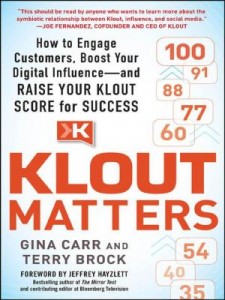 Whether you’re in sales, marketing or HR, you need to understand Klout. And if you’re a small business owner, professional or CEO, you need to fully embrace it.
Whether you’re in sales, marketing or HR, you need to understand Klout. And if you’re a small business owner, professional or CEO, you need to fully embrace it.
Why, you ask?
Gina Carr and Terry Brock do an excellent job of answering that question in their new book, Klout Matters: How to Engage Customers, Boost Your Digital Influence and Raise Your Klout Score for Success.
What exactly is Klout? In simple terms, a Klout score is a measurement of a person’s—or a company’s—online influence. Carr and Brock liken it to a FICO credit score or a BMI (Body Mass Index) score—it doesn’t tell you everything, but it gives you a pretty good idea of where you stand in a simple, easy-to-grasp number.
Your Klout score is based on how, how much and how often people engage with you in the social media world. Klout’s algorithms use more than 12 billion pieces of data every day to determine how influential a given person or brand is.
The average Klout score is 40, on a scale of 1 to 100. The higher your score, the more influential you are. Carr and Brock both have Klout scores in the high 70’s, putting them in the top 1% of online influencers. (Wondering what mine is? See for yourself here.)
Is there value in raising your Klout score? Yes and no. For most companies, your prospective customers aren’t looking up your Klout score to decide whether or not to buy from you. But if you’re a professional (a speaker or consultant for example), or you work in sales or marketing, a high Klout score could mean the difference between the job going to you or to someone else.
However, as a measurement tool, Klout can tell you how effectively you’re engaging with prospects and customers via your social media efforts. As Carr and Brock point out:
“Your Klout Score is going to be a reflection of the marketing and interaction with customers that you do in the right way. We recommend that you do not focus on your Klout Score. Focus instead on doing those activities that are naturally right for connecting with customers and making them ‘giddy with glee.’ Engage with customers. If you focus on doing what your customers want and how you can solve their problems, you will inevitably build your business. As you build your business, the natural outcome will be a higher and stronger Klout Score.”
And that’s not all. Arguably the biggest value in Klout for a company is the emergence of a new sales strategy:
“Another example of using a Klout Score would be for a local business to seek out key influencers. A restaurant might want to target particular customers who have a high Klout Score. These individuals could be offered certain discounts or VIP treatment. These customers would then be able to talk about the service they received and the quality of food at the restaurant.
In the past, advertisers who wanted to reach a given market would pay a lot of money to TV and radio stations, newspapers, outdoor advertising, and other promotional media to get attention. Imagine that if instead of spending all your limited advertising dollars on mass media, you could target those key people who are most influential in areas where your buyers congregate. Engaging your target market with highly influential people is often a much better use of your limited dollars and results in much more sales.”
Carr and Brock offer many more strategies for using Klout in your business, as well as for improving your social media effectiveness, which leads to a higher Klout score. The book covers how to set up your Klout profile, the difference between being influential and being noisy, and tactics for maximizing your impact on Twitter, Facebook and LinkedIn.
Klout Matters is well-researched and well-written. It’s a valuable book for virtually anyone in business. Klout is a whole new type of business tool. And it’s a tool that, if used strategically, can boost your sales and your overall business success.
Get it at Amazon:
Klout Matters: How to Engage Customers, Boost Your Digital Influence–and Raise Your Klout Score for Success


Leave a comment